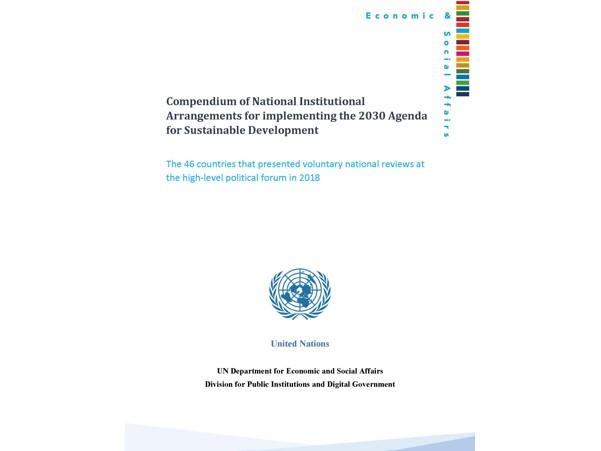Since the adoption of the 2030 Agenda for Sustainable Development in 2015, countries have continuously updated institutional arrangements in order to enable government institutions and other stakeholders to deliver the objectives encapsulated in the Agenda.
This compendium, prepared by the Division for Public Institutions and Digital Government (DPIDG) of the United Nations Department of Economic and Social Affairs, aims to document institutional arrangements related to the implementation of the Sustainable Development Goals (SDGs), in a simple but standard way. It complements two similar volumes published in 2017 and 2018, which covered the UN Member States that chose to present voluntary national reviews at the United Nations High-level Political Forum on sustainable Development (HLPF) in 2016 and 2017.
The compendium covers the 46 countries that presented Voluntary National Reviews (VNRs) in 2018, namely Albania, Andorra, Armenia, Australia, Bahamas, Bahrain, Benin, Bhutan, Cabo Verde, Canada, Colombia, Dominican Republic, Ecuador, Egypt, Greece, Guinea, Hungary, Ireland, Jamaica, Kiribati, Lao People’s Democratic Republic, Latvia, Lebanon, Lithuania, Mali, Malta, Mexico, Namibia, Niger, Paraguay, Poland, Qatar, Romania, Saudi Arabia, Senegal, Singapore, Slovakia, Spain, Sri Lanka, State of Palestine, Sudan, Switzerland, Togo, the United Arab Emirates, Uruguay and Viet Nam.
For each country, the compendium aims to provide information on the following nine institutional topics: (i) national strategies; (ii) national institutional arrangements; (iii) local authorities; (iv) parliament; (v) engaging and equipping public servants; (vi) civil society and the private sector; (vii) monitoring and review; (viii) engaging supreme audit institutions; and (ix) budgeting.
An important source of research for this compendium were the official presentations made by the 46 countries, who presented voluntary national reviews (VNRs) at the HLPF in 2018 (See: https://sustainabledevelopment.un.org/hlpf), as well as the larger reports on which those were based. These reports provided up-to-date snapshots of national efforts to implement the 2030 Agenda and its SDGs. Institutional arrangements were only one aspect covered by national presentations, however, and the emphasis that countries chose to put on them, and the aspects that they highlighted, varied. To achieve comparable coverage for the 46 countries, this source of information had to be complemented by desk research. Among others, various government statements, documents and audit reports, United Nations documents, and online websites and news articles were used.
The research was conducted within the period of June 2018 – December 2018. All the countries covered in the report were contacted through their permanent missions in New York and had an opportunity to review the information that concerned them. Countries that provided feedback were: Australia, Colombia, Lebanon, Malta, Qatar, Saudi Arabia, Sri Lanka and the State of Palestine.
In every country, the institutional landscape evolves over time. Although every effort was made to accurately reflect the situation in each country, information in this compendium will need to 2 be updated periodically to reflect institutional changes. Member States are invited to contribute comments and additional feedback to this compendium by emailing: dpidg@un.org. Stakeholders are likewise welcomed to share their remarks.
File added date: May 2021
Author: UN DESA/DPIDG
Download Publication: English
URL: https://sdg.iisd.org/news/desa-reports-on-institutional-arrangements-for-sdgs-in-46-countries/
 Welcome to the United Nations
Welcome to the United Nations
